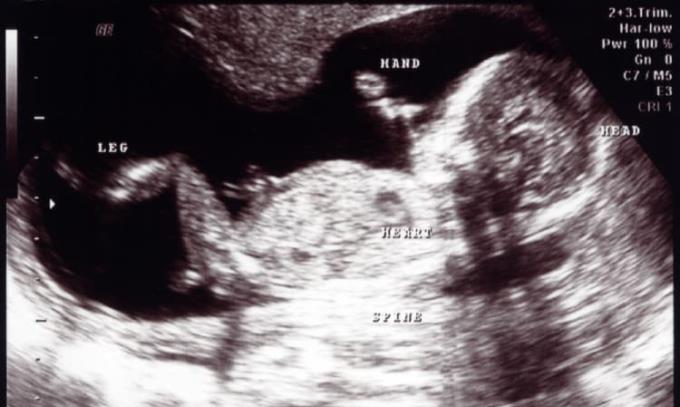The 17th week of pregnancy is extremely important. You need to pay close attention to the 17-week fetal ultrasound to ensure the baby is growing and developing healthy.
By the 17th week of pregnancy , your baby is about the size of the palm of your hand. The baby weighs about 113-140g and is about 11-14cm long. Your baby has grown a lot and you can clearly feel his movements.
At this point, your doctor will recommend a 17-week pregnancy scan to check your baby's development . Please join aFamilyToday Health to continue to share below to understand more about this pregnancy ultrasound.
Why do you need a 17-week pregnancy ultrasound?
Week 17 is an important time of fetal development. At this time, the baby's eyes are still closed but have grown larger. Lashes and eyebrows are also longer. The fetus begins to form a layer of brown fat under the dermis, growth begins to decrease, white fat begins to envelop the nerve roots, hearing also begins to develop.
At this time, the 17-week pregnancy ultrasound will be an important "test" for the doctor to check the size of the head, chest, and length of the thighbone to assess the health of the baby, and also consider whether there are signs signal deficiency or not. Especially, during this pregnancy ultrasound, you can also see that your baby performs a lot of movements such as kicking feet, sucking fingers, stretching back ... very interesting. In addition to these, you should have a 17-week pregnancy scan to:
Check for birth defects in the fetus such as Down syndrome or spina bifida .
Track your baby's heart rate . At this stage, the baby's heart rate will fluctuate from 140-150 beats per minute (double that of adults).
Watch the growth of twins: If you are pregnant with twins , through an ultrasound, your doctor will check to see if there is enough space in the uterus for the baby to grow.
Check the umbilical cord to make sure there are 2 arteries and 1 vein. Your doctor will also check the amount of amniotic fluid to see if your amniotic fluid level is sufficient. If you have less amniotic fluid, you will be at risk for problems such as miscarriage , birth defects , premature birth , stillbirth , delay in utero development ...
Measure the size of the uterus to ensure a healthy pregnancy and the baby has plenty of room to grow. This measurement also corresponds to the number of weeks in your pregnancy and signals that the fetus is developing normally.
Check your baby's body to make sure all parts of the body and internal organs such as the heart, brain, stomach, spine, kidneys, bladder and reproductive organs are developing normally.
You may be interested in: Simple tips for measuring uterine height at home
What should you prepare for a 17-week pregnancy ultrasound?

During an ultrasound of the 17-week fetus, the mother's bladder must contain a little urine so that the doctor can get the best pictures of the baby. Therefore, it is recommended that you drink about 3 glasses of water 30 minutes before the scan and wear comfortable clothes for the doctor to do.
How long does the 17-week ultrasound take?
This scan may take 10 minutes or a little longer because the doctor needs to do several measurements. If you are pregnant with twins, it will take longer.
How is a 17-week pregnancy ultrasound performed?

A 17-week pregnancy ultrasound will be performed in the abdomen. Your doctor will ask you to lie down on the ultrasound bed and apply the gel to your abdomen. Then, the doctor will use the probe of an ultrasonic device moving over your abdomen to take pictures of your baby.
Once done, you need to wipe off the gel. If the baby's parts are not clearly visible during an ultrasound scan through the abdominal wall, the doctor may do an ultrasound scan through the vagina to take a picture of the fetus.
What will you see on a 17-week pregnancy ultrasound?
During a 17-week pregnancy ultrasound, you can see:
Hair on baby's head and small body hairs.
Expressive features on baby's face if 3D ultrasound.
You can see the baby's beating heart and other organs like kidneys, stomach ...
You can see the baby's hands and feet. In addition, you can also see all of your baby's movements during the ultrasound.
Your baby's head has begun to be proportionate to the body and this is evident during the ultrasound.
Your baby begins to have a layer of fat accumulating underneath the skin layer. You can see that the fetus looks rounder and looks like a baby.
The ears and nose were also in the right place. Your baby begins to hear your voice and may be startled by loud sounds.
You can see the baby's spine, arms and legs.
The doctor can see the baby's genitals but will not reveal the baby's sex to you.
What if the 17-week pregnancy ultrasound isn't good?

If any abnormal signs are detected during a 17-week pregnancy ultrasound, your doctor will instruct you to perform other tests such as a blood test, amniocentesis ... to confirm the nature of the problem. After that, your doctor will discuss treatment options with you.
If you are asked to amniocentesis, do not worry too much because this is a very safe test, there will not be any danger. The best time to drain the fluid is when the baby is between 16 and 20 weeks old .
Most pregnant women feel their baby's movement for the first time at 17 weeks in the form of light kicks, followed by stronger kicks. Not only that, hearing the baby's heartbeat, seeing movements and expressions on the fetal face during an ultrasound will certainly be a very positive and exciting experience for parents, especially if this is your first pregnancy.
You may be interested in the topic:
9-week pregnancy ultrasound and what you need to know
Nutrition before pregnancy: What to look for?
Ultrasound pregnancy and 7 things to know before performing














